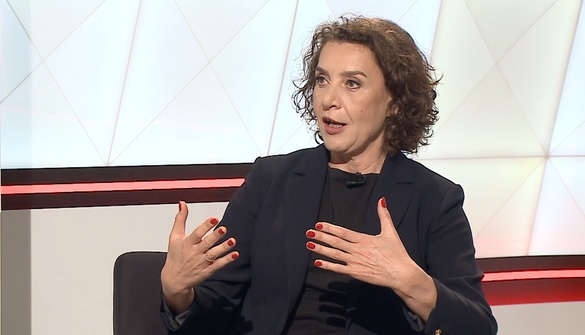Romania’s Path to the OECD: Building New Governance Standards Together

Romania’s accession to the OECD is not just an administrative goal but a profound transformation in how the country governs, finances, and connects to the global economy. Reputation, investment, and the professionalization of corporate governance are among the key benefits anticipated by both public and private stakeholders.
The third edition of Academia de Guvernanță—a media project by Envisia, Profit.ro, and Prima News—brought together Adriana Lobdă (Co-founder, Envisia), Narcisa Oprea (Partner, Schoenherr), Luca Niculescu (State Secretary, Ministry of Foreign Affairs, coordinating Romania’s OECD accession), and Dumitru Chisăliță (Chairman of the Board, Romgaz).
Moderator: Sebastian Zachmann.
The OECD Principles as a Catalyst for Corporate Governance Reform
According to the guests, joining the OECD is not just a strategic goal—it represents a shift in mindset for Romania, toward responsible governance, transparency, and institutional performance.
Adriana Lobdă, Co-founder of Envisia, emphasized that the impact of accession will be felt across all levels—from Romania’s international reputation to how companies operate:
“I am convinced of this, and I am glad to see in recent times many educational initiatives related to the benefits that this accession brings. I am sure we are talking about better visibility, a better reputation, better access to financing, and perhaps a stronger approach to governance itself. All of this is brought by the accession process.”
The Role of Public Administration in SOE Reform
Luca Niculescu, State Secretary at the Ministry of Foreign Affairs and coordinator of the accession process, highlighted that Romania is progressing rapidly, with the target of completing the process by 2026.
“This is an objective we have wanted to achieve for a long time. In 2004 we submitted our first application. In 2022 we started the process. We have to discuss with 25 OECD committees… If this happens, we will be one of the countries that joined the fastest, because OECD standards are rising with every new process.”
He stressed that public administration must move beyond formal compliance and internalize the principles of good governance:
“It’s not just about ticking boxes but about internalizing what happens there. The OECD is the best governance school in the world. It’s like being in a classroom full of top students—you have to be one too, so you don’t lower the standard.”

He also outlined the concrete benefits: a stronger country rating, increased investment, and reduced financing costs.
The Business Sector’s Contribution to SOE Performance
From the business perspective, Narcisa Oprea, Partner at Schoenherr, explained that the OECD principles of corporate governance are already visible in listed companies, where performance, transparency, and clear communication are hallmarks of healthy governance.
“When we see a company that delivers both financial and operational performance, it clearly understands and applies these principles. When a company communicates not only constantly but simply, clearly, efficiently, and on time, it means it understands and applies good governance. So it’s quite simple to see which companies get it right.”

She added that listing on the stock exchange represents a moment of maturity:
“Healthy governance is critical from an investor’s perspective. Even if the law offers protections, investors don’t want to use them—they want the company to evolve sustainably. Once you adopt and apply OECD standards, there’s no other outcome than continued investor interest.”
Dumitru Chisăliță, Chairman of the Board at Romgaz, noted that adopting OECD standards has led to visible progress, particularly in transparency and trust among shareholders:
“Since the 2013 listing and the following processes, we’ve seen major changes. We adopted codes that ensured the company was better represented in relation to shareholders because we considered transparency and trust to be key elements.”
Academia’s Role: Building a Sustainable Governance Culture through Education
Adriana Lobdă highlighted that governance education is the invisible infrastructure of a high-performing economy:
“I think we’ve made progress in recent years regarding governance culture. Companies that go public now train their board members, send them to school, and ensure they understand the principles behind governance. So there’s real progress.”

She underlined the need for a partnership between the state, business, and academia, where each brings unique value:
“Just by how you framed the question, we’re already thinking about an alliance between these three actors—a partnership, each with a different role. From the state’s perspective, transparency; from business, leadership models; and from education, meritocracy and values.”
Governance as Culture: From Formality to Reflex
Dumitru Chisăliță warned that Romania must move beyond formalism and turn OECD principles into a cultural reflex:
“Unfortunately, over the last 20 years, after joining NATO and the EU, we’ve imported many good practices—but sometimes weakened them with our own performance. It’s crucial that these standards become part of our culture—our version of the ‘seven years from home.’”
Romania’s seat at the Global Decision Table
Luca Niculescu concluded that OECD membership will offer Romania not only prestige but also an active voice in shaping global policy:
“Being at the table where decisions are made—or where the future is drafted—is always better than being absent, because those standards will apply to you anyway. It’s better to be among those writing them.”
A Roadmap for a Public–Private–Academic Partnership in Governance
The discussion in Academia de Guvernanță made it clear that Romania’s OECD accession is not just a technical process—it’s a cultural transformation.
Romania now has the opportunity to consolidate its reputation, attract investment, and foster a governance culture grounded in competence, education, and accountability.
Key takeaways:
- OECD is the world’s best school of governance and Romania’s most important national project after NATO and EU accession, with a realistic target for completion by 2026.
- Accession will strengthen credibility, attract investment, improve financing, and enhance citizens’ quality of life.
- Corporate governance will become a core performance criterion for listed companies.
- Board education and professionalization are essential for sustainable leadership.
- Romania will move from rule-taker to rule-maker, reinforcing its global role.
About Academia de Guvernanță
A media project by Prima News, Profit.ro, and Envisia—Romania’s first business school dedicated to corporate governance and the professionalization of board members. Every Friday at 20:00 on Prima News. Replay Tuesday at 22:00. Also available on Profit.ro.
About Envisia
Envisia is Romania’s first business school dedicated to corporate governance and the professional development of board members. Through internationally accredited programs, masterclasses, and media initiatives like Academia de Guvernanță, Envisia helps shape leaders who turn good governance principles into performance and trust. Learn more at www.envisia.eu.
Recommended articles
Leadership, Boardroom Dynamics & Crisis Response
Leadership, Boardroom Dynamics & Crisis Response
Governance & Board Effectiveness
Future of Boards & NED Careers
Future of Boards & NED Careers
ESG & Risk Oversight
Leadership, Boardroom Dynamics & Crisis Response
Governance & Board Effectiveness
Governance & Board Effectiveness
Leadership, Boardroom Dynamics & Crisis Response
Future of Boards & NED Careers
Governance & Board Effectiveness
Governance & Board Effectiveness
Governance & Board Effectiveness
Governance & Board Effectiveness
Future of Boards & NED Careers
Leadership, Boardroom Dynamics & Crisis Response
Future of Boards & NED Careers
 BACK TO ARTICLES
BACK TO ARTICLES
 Facebook
Facebook Linkedin
Linkedin
